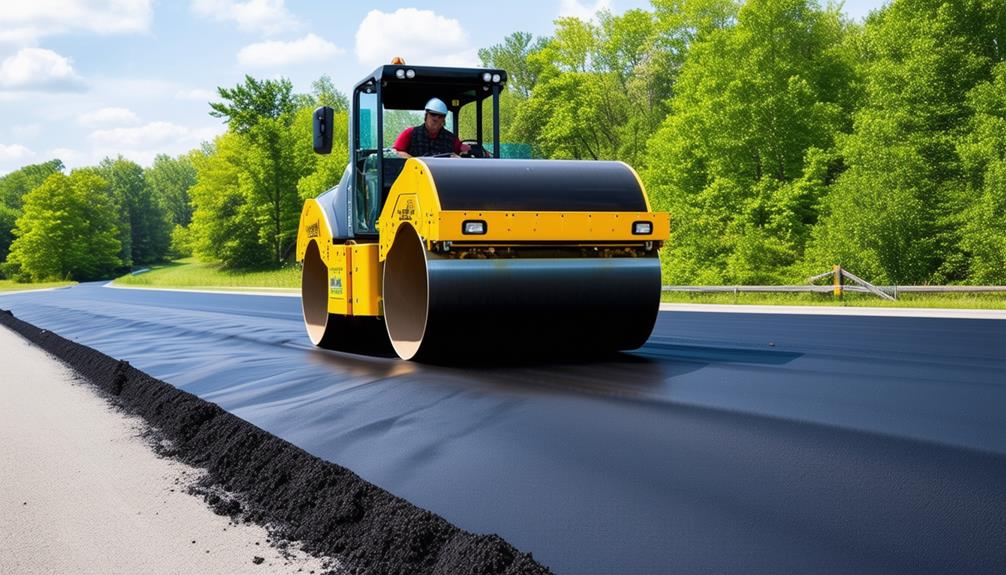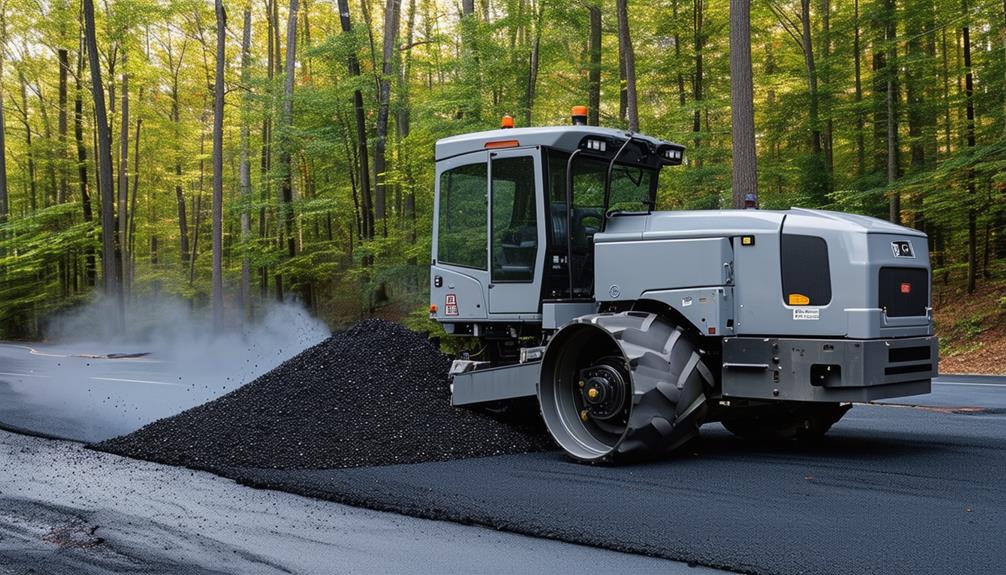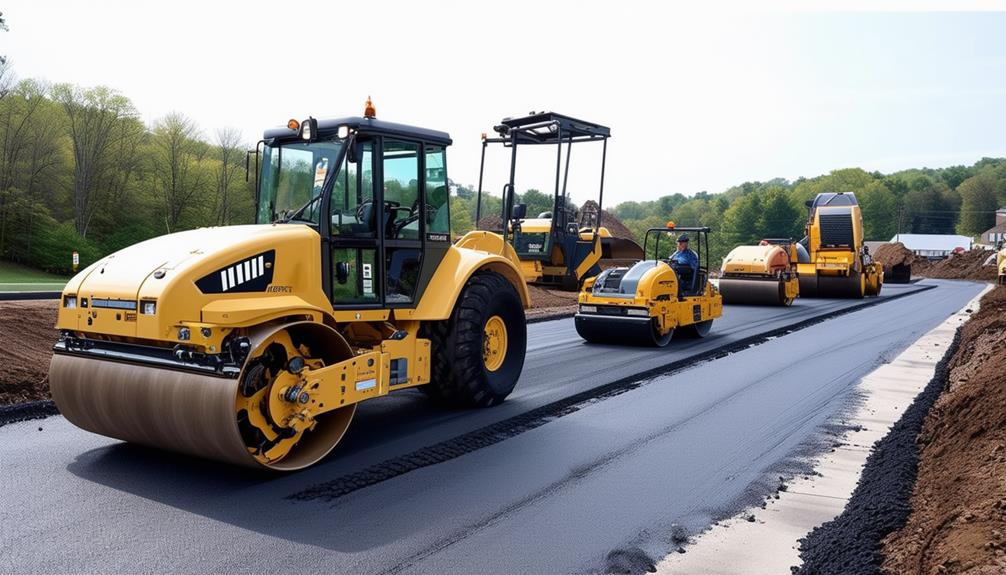The Importance of Proper Asphalt Compaction in Saratoga Springs, NY
Accurate asphalt compaction is essential for a stable and enduring surface in Saratoga Springs, NY, whether it's for a residential driveway or commercial parking area. This technique involves reducing air voids to ensure the pavement can handle substantial vehicle loads without deteriorating.
The method starts with utilizing paver screeds, followed by roller compaction and finally, traffic compaction. Employing the appropriate roller equipment and following the correct compaction technique are key to achieving optimal pavement density.
Adequate compulsion enhances the overall lifespan of the pavement, safeguards against moisture infiltration, and boosts the aesthetic value of your property. By adhering to proven compaction practices, you prevent expensive maintenance issues and provide your estate with a polished and professional appearance.
Move forward with us to discover how to secure this level of precision for your paving project.
Understanding Asphalt Compaction Basics

When undertaking asphalt paving initiatives in Saratoga Springs, NY, grasping the core principles of compaction is essential for crafting resilient and enduring surfaces. Asphalt compaction, a pivotal process, plays a significant role in achieving a smooth and robust pavement structure. It primarily focuses on minimizing air voids within the mixture, thereby enhancing the asphalt's density and structural integrity.
The initial phase of the compaction sequence is managed by the paver screed, which commences the removal of air and fortifies the foundation. Subsequently, roller compaction is implemented through specialized machinery designed to further augment the material's density. The final stage involves traffic compaction, where the continuous movement of vehicles on the fresh asphalt progressively consolidates the surface over time.
Achieving optimal compaction is indispensable for realizing the intended performance and longevity of the asphalt. Efficient compaction methods mitigate the likelihood of expensive repairs and maintenance by decreasing the probability of surface cracks and deterioration.
Methods and Techniques of Compaction

To ensure optimal compaction in Saratoga Springs, NY, it's critical to master the intricate details of selecting the appropriate roller and implementing the correct rolling pattern for your specific construction endeavor. The uniformity of the asphalt blend greatly influences the ultimate outcome. Proper compaction is achieved through the utilization of equipment such as paver screeds, steel-wheeled rollers, and pneumatic tire rollers. These instruments facilitate the creation of shear stress through weight compression, which augments pavement density.
The velocity at which compaction machinery operates is similarly pivotal, as it affects the shear rate and shearing stress, consequently affecting the overall pavement density. Effective coordination and quality oversight are essential in ensuring that compaction methods are executed proficiently and that the resultant pavement conforms to the anticipated standards.
The Role of Compaction in Pavement Durability

Effective asphalt compaction is crucial to extending the lifecycle of pavement infrastructure in Saratoga Springs, NY. Achieving the right compaction metrics ensures the pavement's longevity under extreme conditions and constant usage without degradation.
In Saratoga Springs, asphalt pavements designed with optimal compaction can withstand substantial traffic volumes efficiently, avoiding common issues such as fatigue, raveling, or stripping. This enhancement occurs because compaction significantly lowers air voids within the asphalt mixture, thus reinforcing its overall structural integrity and boosting its resilience.
Pavements that are adequately compacted are also less susceptible to moisture-induced damage, which can trigger expensive maintenance interventions.
Fundamentally, efficient asphalt compaction serves as a cornerstone for pavement durability. Through the adoption of advanced compaction methodologies, financial outlays related to repairs and overhauls can be minimized. Such pavement will exhibit enhanced resistance to deterioration, ensuring it remains robust and reliable for extended periods.
Consequently, prioritizing meticulous asphalt compaction in Saratoga Springs, NY is strategic, supporting the city's aspirations towards sustainability and robust infrastructure.
Effective Compaction Machinery and Tools

Optimized Compaction Equipment and Techniques
Essential compaction equipment such as steel wheeled rollers and pneumatic tire rollers play a pivotal role in Saratoga Springs, NY, where their adept utilization fosters the creation of dense and robust asphalt pavements. Effective compaction induces shear stress, which is instrumental in compressing asphalt mixes to form durable and enduring road surfaces.
The operational velocity of compaction machinery profoundly influences the resultant pavement density. The selection of rollers, whether vibratory or static, is paramount as each type caters to varying conditions and targets specific density requirements.
It is crucial to choose appropriate machinery tailored to your project's needs to attain the required compaction density, thereby averting common pavement issues such as rutting, raveling, and moisture infiltration. This precise approach in equipment selection and usage promises not only cost savings but also the longevity of your pavement infrastructure in Saratoga Springs, NY.
Employing state-of-the-art compaction techniques and tools is essential for upholding superior quality asphalt finishes.
Impact of Proper Compaction on Curb Appeal

When meticulously compacted, the asphalt in Saratoga Springs, NY, transforms driveways and parking areas, resulting in visually appealing and meticulously maintained properties that enhance real estate values. With a properly compacted surface, residents and business owners can boast a sleek and attractive curb appeal that radiates a positive impression. The smooth and uniform surface not only upscales the visual aesthetics but also guarantees a robust and enduring pavement.
An expertly executed compaction procedure considerably diminishes the chance of cracks and potholes, thus preserving the aesthetic quality of your driveways and parking lots. Additionally, compacted asphalt boosts the market value by rendering a sophisticated appearance to the property. It also hinders the accumulation of water and the formation of uneven surfaces, maintaining an appealing exterior.
Frequently Asked Questions
Why Is Asphalt Compaction Important?
Effective asphalt compaction is essential for maximizing the lifespan of your pavement infrastructure. This process results in a smooth, uniform surface that's equipped to endure severe meteorological conditions, thereby minimizing the necessity for frequent maintenance.
Moreover, it promotes adequate water drainage, mitigating the risks of moisture-induced damage and substantially boosting the structural integrity and durability of the pavement.
What Happens if Asphalt Is Not Compacted Enough?
If your asphalt isn't sufficiently compacted, anticipate significant issues in the future. Accelerated surface deterioration can lead to the formation of potholes, which pose a threat to vehicle integrity and safety.
Additionally, uneven settlement can result in an uncomfortable and bumpy driving experience, potentially necessitating frequent and costly repairs instead of seamless travel on the roadways.
How Much Should Asphalt Be Compacted?
To guarantee that your pavement endures for decades, it's imperative to compress the asphalt to the optimal density. The appropriate compaction range lies between 92% and 98% of the theoretical maximum density (TMD).
Utilizing the appropriate compaction machinery, aiming for this density target is crucial; insufficient compaction may precipitate early deterioration, whereas exceeding this range can induce cracking in the asphalt.
How Thick Should Asphalt Be After Compaction?
When discussing the appropriate thickness of asphalt after compaction, achieving uniformity is paramount. Residential driveways generally necessitate 1.5 to 2 inches of compacted asphalt for optimal surface resilience, whereas commercial parking areas demand a thickness of 2 to 3 inches to accommodate frequent, heavy vehicular load.
Ensuring thorough compaction is vital as it ensures uniform thickness throughout, which is essential for the structural integrity and durability of the asphalt pavement.
Conclusion
The Significance of Proper Asphalt Compaction in Saratogue Springs, NY
Grasping the Fundamentals of Asphalt Compaction
- Adequately compacted asphalt is crucial for the longevity of pavement surfaces, enabling the material to endure vehicular stress and mitigate the risk of deterioration over time.
- Compaction efficiently eliminates air pockets, interlocks the aggregate and bitumen components, and enhances the structural integrity and density of the pavement.
Strategies and Approaches for Compacting Asphalt
- The three principal stages of compaction encompass:
- Paver Screed: Initial compression during the asphalt deployment process.
- Roller Compaction: Achieving most of the compaction to minimize air gaps.
- Traffic Compaction: Continuous compression facilitated by regular vehicle movement.
The Importance of Compaction for Pavement Longevity
- Adequate compaction prevents structural failures by minimizing the emergence of fissures, endures harsh climatic conditions, and preserves the visual attractiveness of the pavement.
- Asphalt's flexibility makes it ideally suited to the colder environments of Saratoga Springs, NY, where it can dilate and retract with minimal susceptibility to weather-induced damage.
Necessary Compaction Equipment and Implements
- Compactive machinery such as those available at the Diamond Tool Store are vital for achieving optimal pavement compression.
Influence of Adequate Compaction on Property Aesthetics
- A smoothly compacted asphalt surface can substantially boost the curb appeal of a property, thereby enhancing its market value and visual charm.
In summary, meticulous asphalt compaction is imperative for securing a robust and visually pleasing driveway in Saratoga Springs, NY.
